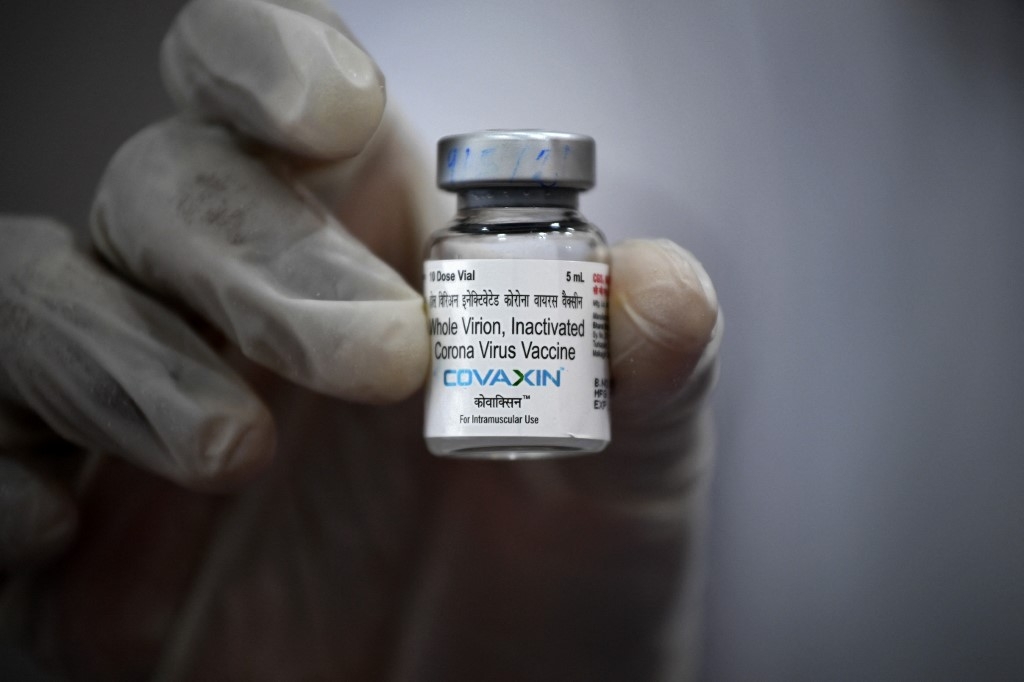Lenders take up pandemic vaccine contribution cause
 |
| (FILES) In this file photo taken on May 09, 2021 A medical worker displays a vial of the Covaxin vaccine against the Covid-19 coronavirus at a vaccination centre in Mumbai. Brazil's health regulator, Anvisa, on June 4 authorised the import of the Russian vaccine Sputnik V and the Indian vaccine Covaxin against the coronavirus, but imposed several conditions for their use in the country. Indranil MUKHERJEE / AFP |
The State Bank of Vietnam (SBV) last week requested credit institutions and foreign banks not to charge organisations and individuals contributing to the COVID-19 vaccine fund transfer fees on these transactions. The SBV also issued Document No.3947/NHNN-TD, requesting that chairmen, general directors, and other leaders of credit institutions and foreign bank branches urgently implement measures to effectively control the pandemic.
State-owned bank BIDV was officially approved to be the receiving bank for the vaccine fund. The entire amount of voluntary contributions will be fully and promptly concentrated on the fund and used for the right purposes in a transparent fashion in accordance with the law.
“BIDV is committed to quickly, safely, and effectively deploying and assisting the fund’s activities, ensuring the provision of the best quality ancillary services for the fund. In particular, BIDV customers are entitled to free transfer of donations to the fund on all channels of the bank,” a representative from BIDV told VIR.
Other banks are also applying a free fee transferring mechanism, such as Techcombank, VietinBank, HDBank, VPBank, and OCB.
Free fee policies have gained ground recently, as banks are vying with each other to increase the current account/savings account (CASA) ratio, in which banks persuade customers to keep money in their banks.
In the first quarter of 2021, the number of online transactions increased by 55.9 per cent compared to the same period in last year. Banks are also actively promoting customers to make transactions online by waiving various fees.
Even before the SBV’s direction, Techcombank was the first lender to apply a zero-fee programme between different banks. This move has successfully led to a sharp improvement in its CASA ratio, and deposit going from 22 per cent in 2017 to 44 per cent in 2020. It is expected to improve its ratio to 50 per cent by 2023, leading to higher net interest margin.
Luu Trung Thai, vice chairman of the Board of Management and CEO of MB noted, “The mass vaccine rollout would undeniably have a profound effect on the whole economy. MB is proudly contributing to the vaccine fund, as well as implementing our fee-less transfer policy and enhancing seamless, convenient services for fund contributors, whether they are retail or individual clients.”
Besides that policy, local and foreign banks are being encouraged to reschedule debt repayment terms for debts incurring repayment obligations from January 23, 2021 to the end of this year, as well as exemption and reduction of interest and fees for affected customers, as prescribed in Circular No.03/2021/TT-NHNN dated April on credit institutions and foreign bank branches carrying out debt rescheduling.
Last week, Vietnam officially established a special fund dedicated to financial aid from local and foreign individuals and organisations for purchase, import, research, and production of COVID-19 vaccines. The fund, directly managed by the Ministry of Finance (MoF), welcomes voluntary financial and vaccine aid, assistance, and contributions as well as other lawful resources.
The fund will be audited by the State Audit Office of Vietnam and the Vietnam Fatherland Front. It is expected to help Vietnam acquire 150 million COVID-19 vaccine doses to immunise around 75 per cent of its population, with a total estimated cost of around $1.1 billion.
Vo Thanh Hung, director of the State Budget Department under the MoF, said that with the assigned tasks, the ministry would thoroughly manage the financial inflows and outflows, supporting domestic vaccine production. The fund’s revenues will also be recorded and will be transparently disclosed on the websites of the MoF and the State Treasury, and will be inspected and audited according to regulations.
What the stars mean:
★ Poor ★ ★ Promising ★★★ Good ★★★★ Very good ★★★★★ Exceptional
Related Contents
Latest News
More News
- Cashless payments hit 28 times GDP in 2025 (February 04, 2026 | 18:09)
- SSIAM and DBJ launch Japan Vietnam Capital Fund (February 04, 2026 | 15:57)
- Banks target stronger profits, credit growth in 2026 (February 04, 2026 | 15:43)
- Vietnam on path to investment-grade rating (February 03, 2026 | 13:07)
- Consumer finance sector posts sharp profit growth (February 03, 2026 | 13:05)
- Insurance market building the next chapter of protection (February 02, 2026 | 11:16)
- NAB Innovation Centre underscores Vietnam’s appeal for tech investment (January 30, 2026 | 11:16)
- Vietnam strengthens public debt management with World Bank and IMF (January 30, 2026 | 11:00)
- Corporate bond market poised for stronger growth cycle (January 28, 2026 | 17:13)
- Vietnam's IPO market on recovery trajectory (January 28, 2026 | 17:04)

 Tag:
Tag:


















 Mobile Version
Mobile Version